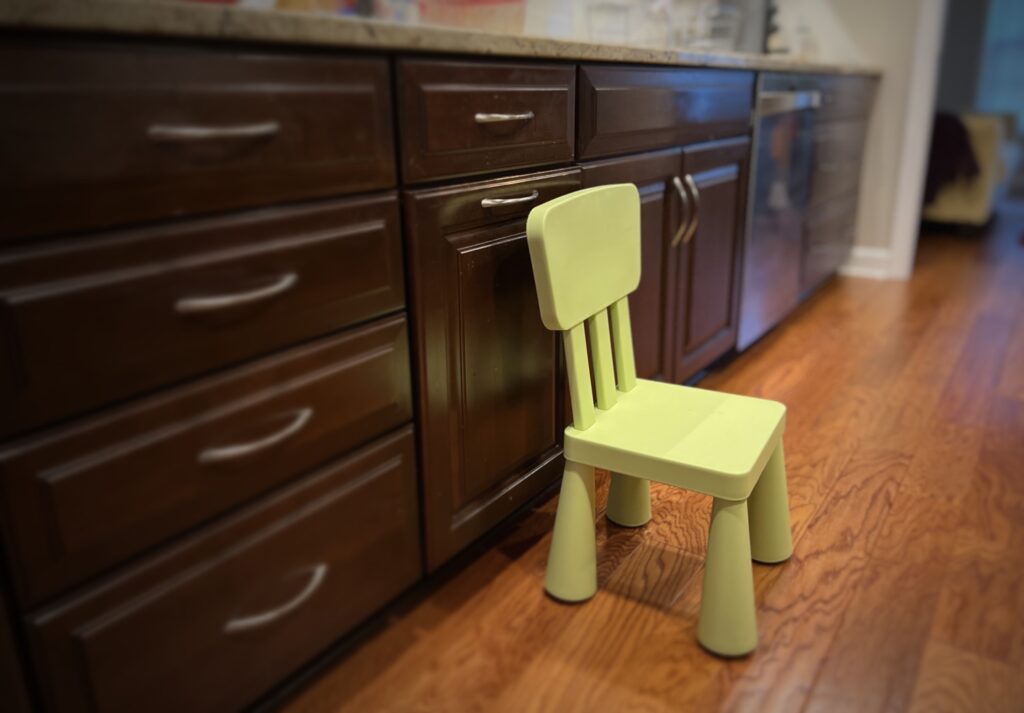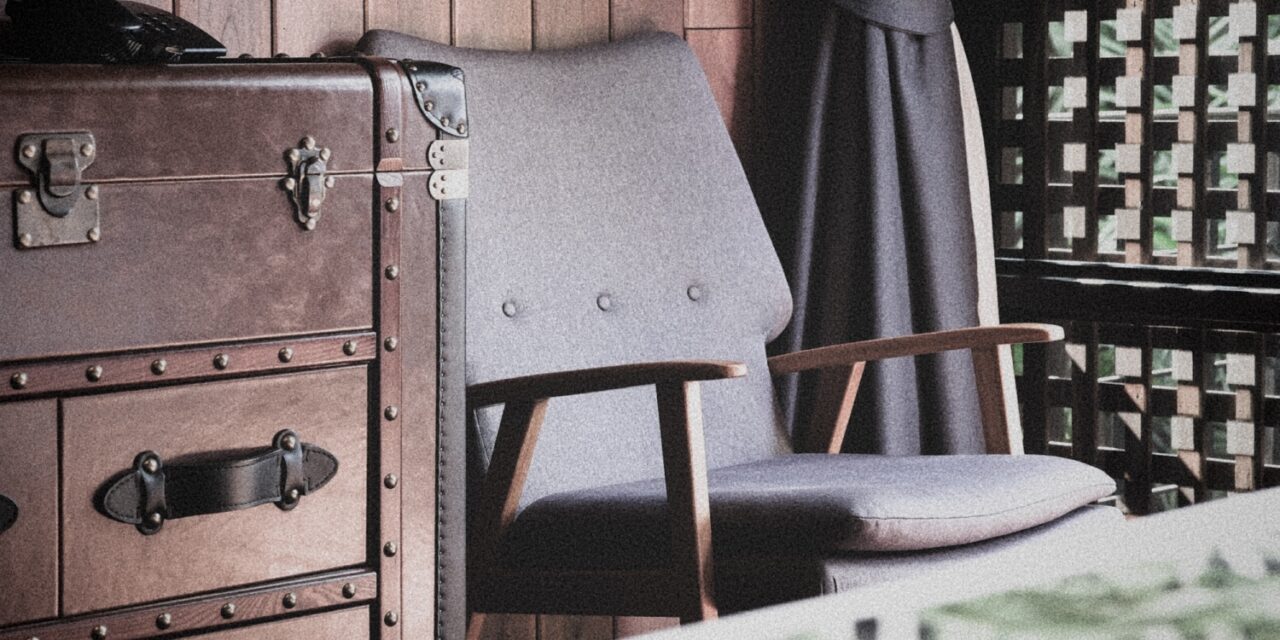 There’s this child-size green chair in our house that always seems to make its way into our kitchen at the most inconvenient times. My children move it to the counter to see what’s going on or to get something and they just leave it there. I invariably bump into it or it blocks a drawer and I constantly find myself shoving it aside while I’m trying to cook or clean. For me, the green chair represents the daily frustrations and inconveniences of parenthood. It symbolises those things that nag at me and get in the way. And like the small chair, just below my range of vision, it surprises me as I run into it.
There’s this child-size green chair in our house that always seems to make its way into our kitchen at the most inconvenient times. My children move it to the counter to see what’s going on or to get something and they just leave it there. I invariably bump into it or it blocks a drawer and I constantly find myself shoving it aside while I’m trying to cook or clean. For me, the green chair represents the daily frustrations and inconveniences of parenthood. It symbolises those things that nag at me and get in the way. And like the small chair, just below my range of vision, it surprises me as I run into it.
The metaphorical chair is what Margaret Silf calls “inner furniture”. They’re the things that get in the way of life-giving relationships, love of self, and love of God. They are our past hurts and traumas, biases and judgements, stereotypes, bad memories or experiences, upbringing, cultural or religious wounds, and even our images of God. We may be unaware of them and they can be invisible to others. They throw us and others off course. Are you one of those people around whom others walk on eggshells? Someone might say, “Don’t mention such-and-such with them!” One piece of inner furniture may be your mother who could never be pleased. That creates resentment within you and when someone else tells you about their close relationship with their mother you get offended or rude or standoffish.
“The trick with the inner furniture,” Silf says, “is not to try to get rid of it … but to make it visible to others.” She says that being aware of our inner furniture frees a space for others who subconsciously realise that a certain issue no longer has the awkward tension of a “NO TOUCH” sign. And that vulnerability and awareness makes us more free and we’re less likely to be thrown off course by these bumps. If we can see the furniture as part of the inner room layout, we can acknowledge it and walk past it, continuing on our way. But even if we know it’s there we may occasionally stub a toe. I think of the opening sequence of the Dick Van Dyke show where Rob Petrie greets his wife at the door and then trips over an ottoman. There was a second opening, however, where Rob sees the ottoman and steps around it.
There are countless examples in the gospels of people’s own inner furniture that got in the way of their life with God.
Riches
Money is the root of all evil, right? St Ignatius named riches as a primary tactic of the evil spirit. There’s the well-known gospel story of the rich young man in Matthew 19:16-22. When the man asked Jesus what to do to inherit eternal life (i.e. freedom!) Jesus said to follow the commandments and to give his money and possessions to the poor. The passage says, “he went away grieving, for he had many possessions.” Riches were his inner furniture, an impediment to a life of freedom. We call this inner furniture because money or things are not inherently bad. It was the young man’s inner clinging to them that put a stop to an even deeper relationship with God.
Power
For many, power can have the size of an armoire or giant sectional in your inner room. Power is about ego, and the ego is driven by the evil spirit. It focuses on classifying relationships and creating hierarchies. The Pharisees and Herodians tested Jesus’ loyalty when they questioned him on taxes (Mark 12:13-17). They sought to trap him and create a power dynamic over him. It was not about “the way of God” as they claimed. Jesus amassed followers and their own power was threatened. This cumbersome furniture blocked their way to true freedom in God.
Hardness of Heart
What people in the gospels seem to bump into the most is their own hardness of heart. This does nothing to build up relationships of care or dignity. When the Pharisees carefully watched if Jesus would heal on the sabbath (Mark 3:1-6) it says “he was grieved at their hardness of heart.” After he heals, the story concludes saying, “The Pharisees went out and immediately conspired with the Herodians against him, how to destroy him.”
And when they questioned him on divorce and how Moses permitted it (Mark 10:2-5), Jesus says, “Because of your hardness of heart he wrote this commandment for you.”
In John 8:1-11 the Pharisees test him again, bringing to him a woman caught in adultery and reminding him that the law says to stone such a woman. “Let anyone among you who is without sin be the first to throw a stone at her,” he responded. And slowly they departed. The Pharisees hardness of heart prevented them from having any compassion or even self-awareness. They could not see the discarded furniture that had piled up in their inner room.
One commentary on this passage imagines that the way Jesus treated this woman was inspired by what he saw in his dad Joseph when he refused to allow Mary to be stoned after her scandalous pregnancy. Joseph and Jesus, who professionally built furniture, did not let their inner furniture get in the way of love and mercy.
 My Own Agenda
My Own Agenda
Sometimes what stops us from serving the greater good is clinging to our own agenda. It’s like that office you arranged so you could do such good and change the world, but over time it’s become full of filing cabinets and piles of paper. Your own stuff has gotten in the way of your original mission. In Luke 9:57-62 a well-intentioned person comes up to Jesus and says, “I will follow you wherever you go.” And Jesus says, this is going to be tough and you may not sleep much. And another well-intentioned person wishes to follow Jesus but says, “First let me go and bury my father.” And another says, “Let me first say farewell to those at my home.” All these people are deprioritising Jesus’ call to love God and neighbour. They make excuses dictated by their own agenda. Living a life for love is radical.
Offence
After Jesus’ Bread of Life discourse (John 6:60-71) some of the disciples say, “This teaching is difficult; who can accept it?” “Does this offend you?” Jesus responds. No doubt some of the Jews listening to him speak about eating his body and blood were offended. Jews were forbidden from consuming blood. And for Jesus to equate himself with the pascal lamb at the Passover meal might have also been offensive. The scripture says that many disciples stopped following him as a result.
Whether it’s a religious scandal like that or something else, the inner furniture of offence is one of the biggest impediments to a life-giving relationship with God and neighbour. When one is offended, the false self is usually the one operating. The true self is less reactive, and can choose to respond more intentionally without threat.
Our true self is aware of the inner room’s layout and can navigate with more awareness of one’s hangups, baggage, and blockades. Whenever we experience a perceived threat in a relationship, a sense of resentment, a resistance of some kind, we should ask ourselves: What is the block here? What is it really that is preventing me from moving toward love?
That green chair is just a part of my life. My intentional awareness of it reduces its grasp on me. Sometimes I bump into it, but it has a place in the layout of my inner room. It represents the reality of parenting—where I am right now—and the curiosity of my children and their desire to help me in the kitchen. And if I need to, I can step around the chair or put it in another room. It is what it is and I keep going.
Related posts:
- The Weeds and the Wheat: Mindfulness and Non-Resistance
- Life’s Mirrors: 4 Ways to Deeper Self-Knowledge
- Jesus’ Paradoxical Life-Giving Tactics
Listen to the podcast version of this post…


 My Own Agenda
My Own Agenda






I always enjoy your podcasts, but many times like the lepers, I fail to come back and give thanks.
Many times I have to listen more than once to get the gist of your message. But I want you to know just how much your podcasts have helped me to at least begin to see my real self.
There is a lot more that needs to be done in my life, but I thank you for your gifts!
That means so much to me. Thanks for your gratitude and affirmation.